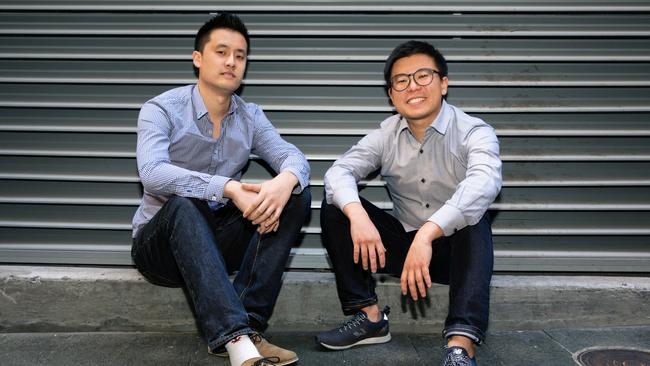Eight per cent of Australians now using sharing platforms like Airbnb, UberX to make cash
SOMETHING radical is happening to work in Australia, and it’s opening up huge opportunities to make easy cash.

TAKING other people’s dogs on road trips, being paid to watch movies at the cinema — it might not sound like it, but this is the future of work.
A rapidly growing number of Australians are turning to sharing platforms such as Airbnb, UberX and Airtasker to earn extra cash as diminishing hours and slower wage growth begin to bite.
That’s the key message of Airtasker’s second Future of Work survey, which found the number of Australians using sharing platforms has doubled since January to 8 per cent.
It comes as the labour force under-utilisation rate — the sum of the unemployed and the underemployed — hovers at 14.3 per cent, and follows warnings from Productivity Commission chairman Peter Harris that wage growth could shrink to half the rate seen in the past 50 years.
20-year-old disability and childcare worker Tori Kelly now works two jobs, but back when she was only working part-time, she turned to sharing platforms to make extra cash.
At one point she made an additional $1000 in a week just from doing odd jobs. “There was a guy that gets me to watch movies and write down the advertisements beforehand, then I just watch the movie, so I basically get paid to go see a movie,” she said.
“I also transported a huge dog from Wollongong to Bondi, which was fun. I’ve got a little Ford Fiesta and it took up the whole back seat. The dog was staying with a family friend while the owner redecorated.”
The representative survey of more than 1000 working Australians, conducted by research firm Pureprofile, focused on a number of issues including pay rises, hours worked, type of employment and desire to earn extra money outside of 9-to-5 jobs.
It found the number of workers on the hunt for a new job in the next 12 months has increased from 43.5 per cent to 45 per cent, while there appears to be growing acceptance of the casualisation of the workforce.
Just under 80 per cent of respondents agreed that the flexibility of working for yourself makes up for the lack of certainty, but there was a slight decrease in the number of workers who agreed (83.4 per cent) that the traditional model of the 9-to-5 office job was inflexible for the future.
At the same time, while more than 55 per cent of workers said they expect a pay rise in the next 12 months, fewer than half actually received one in the past year.
Ms Kelly said if she has a day off or some spare time on the weekends she will keep an eye out for odd jobs to do. She may be an exception for her age group, however. “I’ve recommended it to a lot of my friends, but they can’t be bothered,” she said. “I only know one other person who’s doing it.”

Airtasker CEO Tim Fung said the growing casualisation of the workforce was “not something we should be fighting against” but “trying to find systems to embrace”.
“If you look at the under-utilisation rate, there are significantly more people working fewer and fewer hours, and that trend goes up as you go up the age brackets,” he said. “We’ve got a grey army of users who are reliable, have fantastic skills and want to keep busy but don’t want to lock themselves into fulltime jobs.”
Platforms like 99 Designs and Freelancer are in tune with that incrementalisation of employment, which is too often thought of as a binary on-off switch of 40 hours or nothing, he argues.
“If you’re an employer and you only need someone for 10 hours a week, in a lot of cases what’s happening is people are just not hiring and those jobs don’t get done — no economic exchange is created.”
Whether it’s loaning out your power drill which you only use once a year or letting a stranger use your car while you’re at work, sharing platforms have made “micro-entrepreneurship” feasible.
“It couldn’t happen in the past because the processes used to be so clunky,” Mr Fung said. “It wasn’t worth it to put an ad in the paper to hire someone for an hour’s work.”
Mr Fung said it was time for policy makers and institutions such as banks to embrace and develop coherent policies around peer-to-peer sharing platforms, which still exist in a regulatory grey area.
It comes as the ACT announces it will become the first national capital in the world to legalise and regulate Uber, with reduced fees for taxi and hire car owners to cut their operating costs. The NSW and Victorian governments are also looking at regulating the ride-sharing service amid concerns from the taxi industry.
The NRMA today urged state governments to legalise all ride-sharing services, arguing Uber is “here to stay”. The peak motoring body says the market is changing rapidly and Uber needs to be brought into the fold, while taxis need to become more competitive.
A report by the Victorian Taxi Association said the industry injects $200 million a year into state and federal coffers. Earlier this week the NSW Government began cracking down on UberX drivers, issuing 40 suspension notices.
— with AAP




